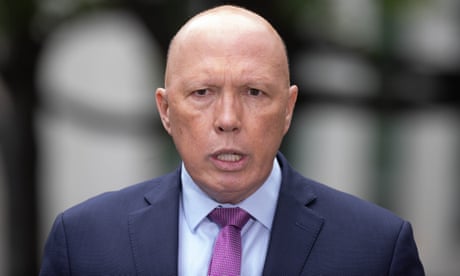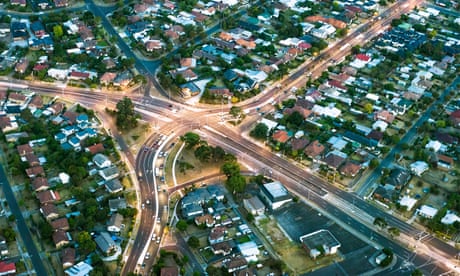Extract from The Guardian

‘There is a grimness in Dutton that aligns with the grimness of the zeitgeist,’ writes Katharine Murphy.
Events have pulled Anthony Albanese on to the world stage, but the latest Guardian Essential numbers tell us many Australians are in an insular mood. More than half of the poll respondents felt isolationism was better than engagement in world affairs at the moment. A majority felt Australia should stay as neutral as possible in the fight between the superpowers – the United States and China. A majority felt Australia should stay right out of the war in the Middle East.
People are also pessimistic about the months ahead. More than half the sample think interest rates are going up again, and a significant majority are braced for summer bushfires at least as bad as the summer of 2019 and 2020.
The new social cohesion report was also sobering. After the polarising voice referendum campaign, amid rising community tensions over the Middle East war and sustained anxiety about the economy, the study’s Index of Social Cohesion reached its lowest ebb since the survey began 16 years ago.
The research also charted the creep of polarisation in Australia. Polarisation is a pathogen that democracies are battling around the world. But this affliction (according to the new research) had “largely passed Australia by to this point”.
Things have shifted, though, over the past couple of years. Tribalism is starting to determine how some people see institutions and the future.
The new research suggests many Liberal and National voters are in a serious funk now Labor is in power. The proportion of Coalition voters who trust the federal government to do the right thing all or most of the time fell by 40 points between July 2021 and July 2023, from 73% to 33%. The proportion of Coalition voters who believe their life will be worse in three or four years increased by 19 points between 2021 and 2023. The number in this cohort who say they are pessimistic or very pessimistic about Australia’s future also increased by 27 points.
This is all quite the brew. It’s a handy time to be a demagogue, riling up your own people, seeking new recruits. Right on cue this week, Big Daddy Dutton, self-styled guardian of public safety, rolled into Canberra thundering about dark days, vulnerabilities and threats.
Big D isn’t a new persona for Australia’s opposition leader, of course. Apart from that very brief, surreal, interlude in 2018 when he wondered out loud whether or not he should smile more, Peter Dutton is a tub-thumping law-and-order populist, ready to roil, ready to rumble.
The high court had supplied fresh material to work with; in a landmark case involving a stateless Rohingya man who faced the prospect of detention for life because no country had agreed to resettle him because he had a criminal conviction for a child sexual abuse offence, the high court ruled that indefinite immigration detention was unlawful in cases where people can’t be deported. This ruling has led to more than 80 people being released from immigration detention.
Bear in mind, just for context, the criminals in the released cohort have served their prison sentences. We do not detain Australian murderers, rapists and child abusers indefinitely. They go to prison, and, eventually, they get released.
In any case, Big D thought he’d cross some streams, Ghostbusters-style; Dutton used the resumption of parliament as his personal sound stage to holler about sneaky, soft, weak Labor governments letting foreign (foreign was important) murderers, rapists and child molesters out of immigration detention, while linking this – somehow – to Albanese lacking fealty to Israel in its time of need.
Big D’s rhetorical thunderclap hit the parliament on Wednesday, after the Scanlon report had dropped: Dutton declared Albanese didn’t care about safety or social cohesion because he was too busy swanning off to Apec.
Now I’m all for blokes finding new hobbies in midlife, but Dutton ululating about social cohesion strains credulity. Big D lives for othering. That’s his brand, his mode, his methodology.
Check the record. Dutton didn’t seem worried about social cohesion when he declared Malcolm Fraser made mistakes in bringing some people (particularly Lebanese Muslims) into Australia in the 1970s. Or when he claimed Victorians were “scared to go out to restaurants” because of “African gang violence”. Or when he contended pregnant victims of rape on Nauru were “trying it on” by seeking abortions in Australia.
I could go on, but I suspect I’ve made my point.
While Dutton was fully extended being incendiary, the Liberal frontbencher Dan Tehan – generally a mild-mannered sort – went to town on the high court’s decision. Tehan struggled to comprehend why the government wouldn’t respond to the ruling by locking people back up again.
Aided by a rising media clamour, Tehan professed himself more interested in the court of public opinion than a ruling from the highest court in the land. He demanded ministers ignore any rule-of-law-hugging shiny bums in their own departments. “Direct your department to get you the outcome that the Australian people want, and it’s very clear what that outcome is … they want these people re-detained,” Tehan said. “We need a new regime in place to do it.”
Regime felt like a well-chosen word, in context. Margaret Thatcher once said the road to tyranny starts with undermining legal rights and the rule of law. She’s dead right about that – but these days, the Iron Lady would be howled down for her heresy.
Contemporary rightwing populists masquerading as conservatives aren’t great champions of the rule of law, because it constrains their illiberal impulses. But I urge readers to listen closely to what is being said, rather than being swept up in narratives of foreign murderers and rapists roaming the streets. Community safety is obviously critically important – and so is the rule of law.
Courts aren’t inconveniences: they are there to shield citizens from the arbitrary whims and prejudices of autocrats. We can either have politicians dishing out arbitrary “justice”, or we can have courts enforcing transparent laws that apply to all citizens equally, including the people who write them.
Those are the options. I know which I prefer.
Big D’s Big Foray was certainly base politics, but it had a catalytic effect. “Albo” woke up. Australians haven’t seen “Albo” for a while; he’s been replaced by a polished prime ministerial peacenik called “Anthony”.
On Wednesday, in response to Dutton’s self-serving overreach, “Albo” suspended strategic tranquillity, a core doctrine of “Anthony’s” prime ministership, and served a pulse of raw “Albo” energy. As was widely reported, the member for Grayndler shook with rage. “Albo” told his opponent linking antisemitism with the decision of the high court was “beyond contempt”. During times of social division, politicians had a choice: they could either lead, or stoke the fire.
This was a dose of moral clarity, deployed crisply, to good effect. But that was as far as it went. After Albanese left the country, the government sued for peace on the high court’s indefinite detention ruling. The rancid politics of freed foreign murderers and rapists was evidently too toxic to ride out.
It wasn’t just the politics determining the play. The court’s ruling did necessitate a technical fix to ensure the people freed by the court decision – people who could now neither be deported nor detained – would face consequences if they breached their visa conditions. Labor needed numbers to pass emergency legislation. The Coalition had amendments.
The government could have toughed that out, insisting the fix be passed. But Labor chose not to; the amendments were accepted. It wasn’t edifying, and it feels inevitable this “fix” will be subject to further legal challenge. Courts will consider whether the fix is proportionate.
It’s very clear that Big D believes the times suit him. That was the lesson of the referendum and he senses fortune is running his way in the aftermath.
There is something to this assessment; there is a grimness in Dutton that aligns with the grimness of the zeitgeist. Australia’s self-styled strongman isn’t a statesman, but he is bulky and belligerent enough to block out the light.
But the thing about professional polarisers is they don’t just rally disciples; they fire up and motivate their opponents as well. As I said a minute ago, “Albo” woke up this week. It will be interesting to see if this awakening persists.
Other forces in the parliament also regrouped to take Big D on. The teal independent Zoe Daniel was sufficiently galvanised by Dutton’s overreach on antisemitism to request a special matter of public importance debate to allow MPs to represent their anxious communities (as opposed to being taken hostage by the grim kabuki play of the week).
Daniel’s request was granted. She delivered a cut-through speech; so did Labor’s Tony Burke, Anne Aly and Josh Burns, crossbenchers Helen Haines and Allegra Spender – and several other participants. These parliamentarians found words to empathise and to soothe.
They decried both antisemitism and Islamophobia. They abhorred the slaughter of Israeli and Palestinian innocents. They lamented the trauma this was creating for diaspora communities. The contributions were emotional. They were considered. These were moments of leadership, of grace and elevation. Moments of hope.
This was representative politics at its finest.
Not one Liberal or National MP spoke.
Make of that what you will.


No comments:
Post a Comment